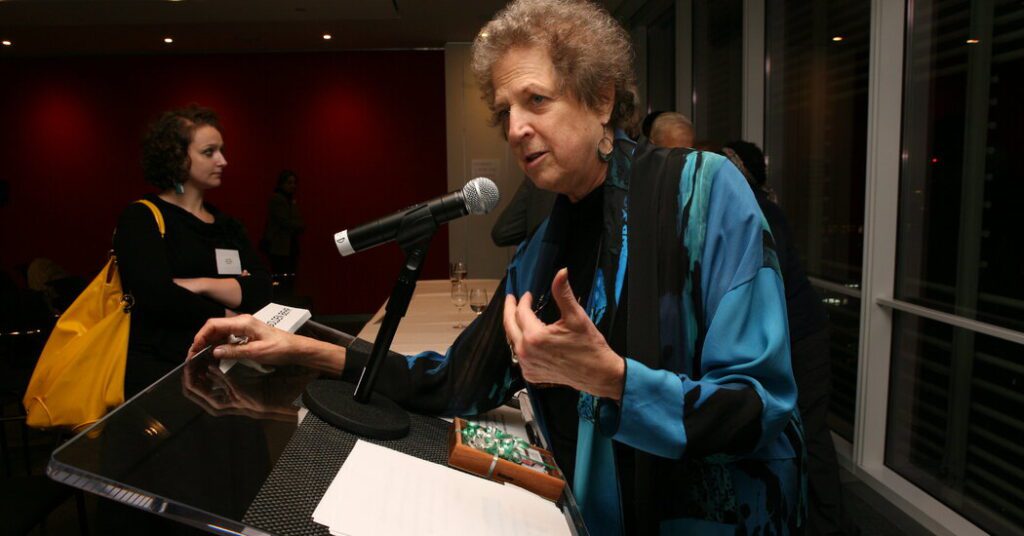Soma Golden Behr, a longtime senior editor at The New York Instances who was a centrifuge of story concepts — they flew out of her in all instructions — and whose journalistic passions have been poverty, race and sophistication, which led to reporting that gained Pulitzer Prizes, died on Sunday in Manhattan. She was 84.
Her demise, within the palliative care unit of Mount Sinai Hospital, got here after breast most cancers had unfold to different organs, her husband, William A. Behr, mentioned.
Ms. Golden Behr, whose economics diploma from Radcliffe led to a lifetime curiosity in points round inequality, was instrumental in overseeing a number of main sequence for The Instances that examined class and racial divides. Every enlisted squads of reporters and photographers for intensive, typically yearlong assignments.
“How Race Is Lived in America,” overseen with Gerald M. Boyd, who would turn into the paper’s first Black managing editor, peeled away the traditional knowledge that the nation on the flip of the twenty first century had turn into “put up racial.” Its deep dives into an built-in church, the army, a slaughterhouse and elsewhere gained the paper the Pulitzer Prize for nationwide reporting in 2001.
One other sequence, “Class in America,” was an examination in 2005 of how social class, usually unstated, produced obvious imbalances in society.
And earlier, Ms. Golden Behr oversaw a 10-part sequence in 1993, “Youngsters of the Shadows,” which pushed previous stereotypes of younger folks in internal cities. The reporter Isabel Wilkerson gained a Pulitzer in function writing for her searing portrait within the sequence of a 10-year-old boy caring for 4 siblings.
Employed by The Instances as an economics reporter in 1973 after 11 years at Enterprise Week, Ms. Golden Behr was usually one of many few ladies, or the one girl, on the desk. She was the primary to steer the nationwide desk, appointed in 1987, and after a promotion to assistant managing editor in 1993, she was solely the second girl from the newsroom to seem on the masthead.
“At 5 ft, 10-and-a-half inches tall, her presence may fill nearly any room, and she or he not often needed to fear about males speaking over her, which gave her a bonus over many ladies at The Instances,” Adam Nagourney wrote in “The Instances,” a 2023 guide on the up to date historical past of the paper.
Mr. Nagourney described her as “cerebral, contemplative and explosive, ,” and quoted her in an interview: “I’m a phrase salad; I explode so much.”
Jonathan Landman, a former deputy managing editor of The Instances, whom Ms. Golden Behr plucked from the copy desk to edit nationwide correspondents, mentioned her type was markedly totally different from different desk heads.
“She wasn’t an editor who mentioned we want x to put in writing y,” he mentioned. “She’d say, ‘We gotta take into consideration housing!’ What would then come after that was fascinating conversations and memos, and she or he’d get folks considering thematically in ways in which have been totally different. It was one thing.”
Although Ms. Golden Behr was a pioneer, and she or he mentored different ladies on the paper, she didn’t see herself as an ideological feminist.
In 1991, throughout her tenure as nationwide editor, the paper got here beneath heavy hearth over a profile of a younger girl who accused William Kennedy Smith, a nephew of Senator Edward M. Kennedy, of rape. Critics inside and out of doors the newsroom accused the newspaper of voyeurism and shaming the girl by quoting a good friend who mentioned she had “a little bit wild streak.”
At a contentious newsroom-wide assembly, Ms. Golden Behr defended the article. “I’m shocked by the depth of the response,” she mentioned, including, “I can’t account for each bizarre thoughts that reads The New York Instances.’’
Soma Suzanne Golden was born on Aug. 27, 1939, in Washington, D.C., the oldest of three kids of Dr. Benjamin Golden, a surgeon, and Edith (Seiden) Golden.
She graduated with a B.A. from Radcliffe School and an M.S. from the Graduate College of Journalism at Columbia. In 1974, she married Mr. Behr, a social employee and a psychoanalyst. The couple lived in Manhattan and Hopewell Junction, N.Y.
Steven Greenhouse, a former enterprise and labor reporter at The Instances, recalled that when Ms. Golden Behr was lured from Enterprise Week in 1973, the place she was chief economics author in Washington, it was thought-about a coup.
“Making the coup even greater on the time, Soma was a star who was a lady,” Mr. Greenhouse mentioned. “She was vastly revered within the economics subject.”
4 years later, Ms. Golden Behr was named to the editorial board. She was the one girl completely writing editorials, usually on ladies’s points, homosexual rights and inequality.
“After a couple of years she mentioned one thing like, I don’t know that I’ve any extra opinions, I’ve mentioned all of it,” Mr. Behr recalled. She moved on to edit the Sunday enterprise part for 5 years.
Apart from her husband, she is survived by their daughter, Ariel G. Behr, who works for a nonprofit that funds reasonably priced housing; their son, Zachary G. Behr, an govt on the Historical past Channel; 4 grandchildren; and a sister, Carol Golden.
On retiring from journalism in 2005, Ms. Golden Behr turned director of The New York Instances School Scholarship Program, which paid 4 years of bills for college students who had excelled academically regardless of troublesome circumstances like homelessness.
When its funding was reduce, Ms. Golden Behr and a accomplice, Melanie Rosen Brooks, created the same impartial program in 2010, Scholarship Plus — an extension of Ms. Golden Behr’s need to deal with inequality. Scholarship Plus, funded by donors, helps 20 college students from poor backgrounds yearly, supplementing their school monetary help to allow them to keep away from scholar loans, making an attempt to place its students on equal footing with prosperous friends.
Ms. Golden Behr typically missed the camaraderie of the newsroom. She would invite journalists she had labored with over time — all of them ladies — to her dwelling on the Higher West Aspect. Till the pandemic ended the gatherings, as many as 30 ladies would attend, driving from as far-off as Boston.



